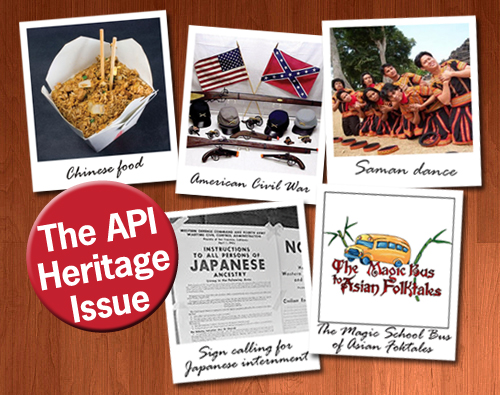By Tessa Sari
Northwest Asian Weekly

During Asian Pacific Islander (API) Heritage Month, we typically focus on the past — on what has happened and the events that have shaped who we are. But for a change, we decided to focus on the here and now.
So, what’s currently happening on the API front in the United States? Here are the top 10 events that are shaping our lives today.
1. The popularity of Chinese food is undeniable. That’s why the Smithsonian American History Museum in Washington, D.C., has a showcase called Sweet & Sour, which explores the history of Chinese food in America. The exhibit displays photographs and graphics, vintage signs, documents, and cooking and eating utensils to illustrate Chinese cuisine culture and its place in U.S. history.
2. Indian American cancer specialist Siddhartha Mukherjee won this year’s Pulitzer Prize in the general nonfiction category for his book, “The Emperor of All Maladies: A
Biography of Cancer.” The book is recognized as a worldwide bestseller. Meanwhile, the 2011 Pulitzer Prize for music was awarded to Zhou Long for his opera “Madame White Snake,” the story of a mythical snake that transforms into a woman. Madame White Snake premiered on Feb. 26, 2010, by Opera Boston at the Cutler Majestic Theatre. In journalism, Chicago Sun-Times photographer John J. Kim teamed up with Frank Main and Mark Konkol and received the Pulitzer in local reporting. They covered violence in Chicago neighborhoods and the widespread code of silence that impedes solutions.

3. On April 14, California lawmaker Rep. Mike Honda reintroduced the Strengthen and Unite Communities with Civics Education & English Development (SUCCEED) Act in Congress. The bill is expected to help Asian Americans to be more proficient in the English language. The bill aims to provide English literacy instruction on the rights and responsibilities of citizenship, naturalization proceedings, civic participation, and U.S. history and government.
4. Not many people know that the Chinese participated in the American Civil War. Back in 1861, there were only about 200 Chinese Americans living in the eastern part of the United States, 58 of whom fought in the Civil War. There were also natives of other Asian countries, such as India and Singapore, who served during the war, mainly in the Union Army and Navy. This Asian participation became the main focus of the commemoration of the 150th anniversary of the Civil War this year.
5. Konrad Ng, a scholar of Asian American cinema and digital media, has been named the director of the Smithsonian Asian Pacific American Program, a program that provides vision, leadership, and support for Asian and Pacific Islander American initiatives at the Smithsonian. Ng has been an assistant professor at the University of Hawaii at Manoa’s Academy for Creative Media since 2007.
6. The United Nations Educational, Scientific, and Cultural Organization (UNESCO) is set to officially list the Saman Dance from Aceh, Indonesia, as the Intangible Cultural Heritage of Humanity. The Saman is an ancient dance that doesn’t involve any musical instruments. The dancers themselves sing and clap their hands to make harmony in movement and sound.
7. Marissa Peterson has become the only Filipino American to serve on the board of a Fortune 500 company, Humana Inc. Peterson graduated from General Motors Institute in 1983 before going on to Harvard business school. She is best known for the 17 years she spent at Sun Microsystems Inc., in Santa Clara, Calif.
8. Mayor of Fukushima Katsunobu Sakurai, Chinese artist Ai Weiwei, and Indian cricket captain Mahendra Singh Dhoni are listed in the 2011 “Time 100.” They’re each recognized as one of the 100 most influential people in the world. Other Asian names include Aung San Suu Kyi, China Defense Minister Liang Guanglie, Asian American singer Bruno Mars, and Korean singer Rain.
9. “The Untold Story of Ralph Carr and the Japanese — Fate of 3 Japanese Americans and the Internment,” a documentary film celebrating a governor’s fight against the illegal internment of Japanese Americans during World War II, is slated for production. The movie is a joint creation of Nitto and Fujisankei Communications International, Inc., the American subsidiary of a large Japanese media group.
10. The SteppingStone Theatre in St. Paul is collaborating with Mu Performing Arts, one of the nation’s premier Asian American theaters, to present a revival of “The Magic Bus to Asian Folktales.” In the show, a school bus driver has a magic satchel that holds ancient fables from Asia.
The children on the bus are magically transported to China, Laos, and the Philippines, where they act out the stories and learn the morals they teach. ♦
Tessa Sari can be reached at info@nwasianweekly.com.



